Tag: Emily Ball ’22
Writer vs. Writer: Is LinkedIn Ultimately Helpful or Harmful for Students?
by kwheele4 on February 4, 2021
Opinion
Writer vs. Writer: Is LinkedIn Ultimately Helpful or Harmful for Students?

Helpful
by Emily Ball ’22
Opinion Staff
As college students approach the end of their four years, they must begin to think about their future careers. Applying for internships and jobs is a difficult and tedious process that is made easier through the use of employment and networking services such as LinkedIn.
Some argue that LinkedIn is not helpful for students, but it is in fact a useful tool that provides an easy way to search and apply for jobs. Although it does not display job opportunities for every career path (for instance, medical fields and educational fields), it can be a very helpful platform for people who are interested in entering the business or creative fields.
LinkedIn can allow you to connect with people who attended your school, which is a valuable feature for students trying to network and make connections in the professional world. When you create your LinkedIn profile, you fill out a section about your education. From then on, every company and job you look at tells you how many people from your school are employed there. This feature is beneficial for students because they can create connections with people who share the same educational background and experience.
“During an internship search a couple weeks ago, I found a position I really liked but didn’t have any connections,” said Caroline Franks ’22. “I ended up finding an alumni that I knew that worked at that company through LinkedIn, and I messaged her. We set up a phone call, and she told me all about the position and made me very prepared for the interview. I really love the feature of connecting with alumni because it helped me with the internship process.”
If a job or internship application asks for an additional website, LinkedIn is the perfect link to include. Attaching a LinkedIn profile works as a supplement to the application that provides insight on additional accomplishments or accolades you have received.
LinkedIn is a strong first step for college students trying to enter the workforce. This tool shows how Friartown can extend beyond the borders of our campus as Friars continue to open doors, one connection at a time.
Harmful
by Madeline Morkin ’22
Asst. Opinion Editor
Whether professors require students to create a LinkedIn account or a student decides to develop one on their own, it immediately becomes a must-have for every college student. Early in their college career, this professional online platform is forced onto students as they are constantly reminded of the necessity of social networking and building professional relationships.
While the buzz around LinkedIn’s importance is loud, many students watch their semi-familiar connections, or network friends, succeed while they sit behind laptops—uncomfortable, lonely, and anxious because of their own lack of experience, professional employment, or prior successes.
LinkedIn is problematic in that it compels young, and often inexperienced, students to believe that finding a job or knowing what they are going to do in the future is a simple task. The site creates an anxiety-provoking environment wherein less certain site members constantly compare themselves to their more accomplished connections.
On a daily basis, students’ connections post about their acceptance into a new workplace, plans to start a new class, or successes as they enter into another full year with a particular company.
Just like other social media platforms, LinkedIn exposes today’s younger generations to strictly the best aspects of the lives of their “connections.” While other social media networks focus on the best of people outside the workplace, LinkedIn complements this practice by showing only the best of people’s professional lives. On this platform, students have access to any connection’s job experience, GPA, resume, skills and endorsements, number of connections, majors and minors, along with a whole list of other personal and professional information, as well as successes.
However, nowhere does the site provide a section for connections to view any bad qualities, worst habits, or unsuccessful employment history. So, students are left to focus strictly on other people’s best qualities and experiences, which are often greatly exaggerated.
Oftentimes, anxiety provoked by LinkedIn urges students to take jobs that they may not necessarily want to accept. Having a perfect first job or internship is oftentimes unrealistic, but students want one because their connections are constantly posting about a new job or internship that seems even better than their own. The reality is that these connections are likely not truthfully “extremely excited to join” their new workplace despite their post.
Ironically, through the constant bombardment of the professional and educational successes of others, LinkedIn often has the unintended consequence of making students feel worse about their current situation than they should.
Giving It the New College Try: Admissions Office Adjusts to COVID-19 Protocols
by The Cowl Editor on November 12, 2020
Campus
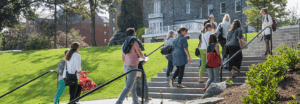
by Emily Ball ’22
News Guest Writer/Opinion Staff
With the current pandemic, the future class of 2025 has been dealt an unfair hand. Because of the COVID-19 pandemic, their senior year looks drastically different than they expected, and their college application process has been more complicated given a lack of physical interaction with college campuses.
Associate vice president and dean of admission and financial aid Raul Fonts said on the topic, “The pandemic has had an enormous impact on families/students’ ability to determine where they would apply. Many students have not had the opportunity to visit college campuses physically, and while virtual programs and tours assist with the college process, I don’t think it can replace the impact of visiting a campus.”
Given these circumstances, the Providence College Office of Admission has been very accommodating with the prospective class, announcing several new initiatives to help deal with these unprecedented times.
In an email to prospective students, the Admission Office stated, “The Early Action and Early Decision I application deadlines have been extended until November 15. For your first year in college (fall 2021 and spring 2022), rentals of any textbooks required for your courses will be provided to you free of charge through our partners at the campus bookstore. The Office of Admission will waive the $65 application fee for any student who submits their Common Application Oct. 23-25. Beyond those dates, we will continue to honor fee waivers for those who meet NACAC and Common Application qualification criteria. Providence College has significantly expanded our merit scholarship program for students applying for admission to the Class of 2025 and we will increase the number of scholarship offers made by approximately 35%.”
Along with these adjustments, the Admission Office has worked with student Admission Ambassadors to engage with prospective students virtually in order to provide campus tours, answer questions the students may have, and talk about the PC experience. This switch to virtual programming has benefitted the prospective class by giving them an insight into life at PC, even if they are unable to visit the campus physically.
“The office has found new ways to engage prospective students including virtual admissions information sessions, virtual high school visits, a new online tour of campus, and online Zoom panels aimed at specific prospective student groups. I had the opportunity to speak on a panel for specifically students from New Jersey since that is my home state,” Admission Ambassador Kristen Moran ’22 said.
These changes and adjustments have helped prospective students and their families deal with the stress of applying to college during a global pandemic. The accommodations provided by the Admission Office help ease the difficult decision of deciding where to attend college.“The family/student reaction was overwhelmingly positive. Many students started their senior year late in September/October and many did not have guidance counselor support until later in October. I think families truly appreciated having two more weeks to submit their applications. We also heard from many high school counselors who were very supportive/appreciative of our decision to extend the deadline,” Fonts said.
Once the application period ends, the Admission Office plans to continue accommodating these newly accepted students, yet it is unknown whether these plans will be virtual or physically on campus. However, the office hopes to provide new ways for the class of 2025 to see and experience PC.Fonts said, “Our favorite word in the Admission Office is ‘pivot,’ and we have continuously worked to provide the best access to PC that we could possibly provide students and families. Our presence virtually has been very strong, but we will need to continue to manage our application review process and will need to provide new creative ways for admitted students to see PC in the spring to assist them with their decision-making process.”
Despite the uncertainty that prospective students are facing as they enter the college admissions process this fall, they can rest assured that PC will continue to adapt to the times and provide them with a safe and productive alternative to see all that Friartown has to offer.
Harmful Language and Inaccurate Assumptions: The Importance of Being More Sensitive to Those Suffering from Eating Disorders
by The Cowl Editor on October 16, 2020
Opinion
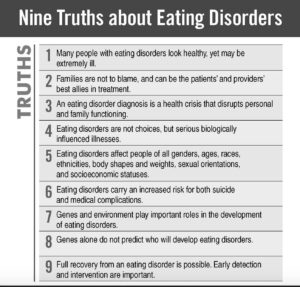
by Emily Ball ’22
Opinion Staff
Trigger Warning: This article contains a discussion about eating disorders.
In a culture that is hyper-aware of physical appearance and body image, the diagnosis of eating disorders has become a more prevalent issue. According to the National Eating Disorders Association (NEDA), “An estimated 30 million Americans suffer from an eating disorder at some point in their lives.”
Those that fail to understand the magnitude of eating disorders must work to be more sensitive to harmful rhetoric and inaccurate popularized beliefs that can be triggering to those suffering from eating disorders.
Our society tends to falsely characterize anorexia as a dietary choice, while, in reality, this type of language undermines the true struggles that somebody suffering from anorexia endures on a daily basis. In fact, anorexia is the complete opposite of willpower and control, and romanticizing it is harmful to somebody whose life is upended by this illness.
“Our culture sees and promotes anorexia as a self-control ideal. In reality, anorexia is a deadly mental illness and is anything but control,” said Erin Gargaro, a member of the NEDA community.
By using language that falsely idealizes anorexia, we are indirectly discouraging those suffering with eating disorders from seeking the help that they need. Those suffering may begin to think that their illness is not actually an illness when society idealizes it.
An instance of this harmful rhetoric occurred in 2018 when Amazon plastered language undermining the issue of eating disorders on the front of a sweatshirt.
“The ‘Anorexia Styling Hoody for Women’ sold by ArturoBuch on Amazon reads ‘Anorexia (an-uh-rek-see-uh) Like Bulimia, except with self control,’” the NEDA said.
Although Amazon has since made this sweatshirt unavailable for purchase, this type of triggering language is still prevalent in society today and is very damaging to the mind of someone suffering from anorexia.
An additional common yet factually incorrect belief is that all people who suffer from eating disorders are “skinny.” This belief is harmful to someone who is considered an average weight or a weight that is somewhat above the average for their age group, as this language discounts their pain and suffering from an eating disorder.
“I knew I had become a little obsessed with food and how I felt about my body, but I felt an eating disorder was something ‘skinny’ people got, and I wasn’t ‘skinny.’ However, the doctor explained to me that people of all weights and sizes can develop eating disorders and that he felt my behaviors indicated I had bulimia,” Marie Duffy, a mental health advocate, said.
The misconception that somebody suffering from an eating disorder must be “skinny” is harmful to people who do not fit into that stereotype. Those undergoing this experience will feel as though their struggles are unjustified because they do not look like somebody society would perceive to be suffering from an eating disorder.
The focus on body image is omnipresent in modern society. As such, it is important to be sensitive when talking about eating disorders. The language that you use can be harmful, even if that is not your intention, as you never know the full extent to which somebody is suffering.
Tangents & Tirades
by The Cowl Editor on October 1, 2020
Opinion
The Harsh Realities of Outdoor Classrooms
Providence College has attempted to normalize hybrid classrooms, in which both in-person and remote students are in class at the same time, but one new addition to campus has shown serious faults in providing all students an equal education—outdoor classrooms.
Big white circus tents lit with inviting, warm bulbs have popped up around all corners of campus. In theory, these tents may seem like a fantastic and innovative solution to the social-distancing mandates brought on by the COVID-19 pandemic. In reality, though, any remote student attending a hybrid outdoor lecture over Zoom knows that this experience has been less than ideal and not an enticing opportunity by any means.
While the outdoor students benefit from fresh air, personal conversation, and larger physical gatherings, their Zoom counterparts are struggling online. Choppy audio, whistling wind tones, nearby dorm music, car engines and alarms, and hushed, critical information from professors and classmates fill the earbuds of online students who are attempting to listen on the other end. Although each group is paying the same tuition, in-person students leave fresh-faced and fulfilled while Zoomers log off confused and unlearned.
While PC has made some necessary and creative developments to on-campus learning and teaching, there must be a more precise structure or formula for outdoor learning before it can continue as a commonplace option for class. In order to provide both in-person and remote students an equal education during their time learning physically apart, hybrid classrooms must return to their more familiar location inside an on-campus classroom enclosed by four walls.
— Madeline Morkin ’22
Dress for Success on Zoom
Waking up to get out of bed just to spend all day sitting in front of your laptop does not increase the motivation to put on a nice outfit for the day. Many of us stick to sweatshirts, or even t-shirts for our daily Zoom classes. But is this what we should be wearing?
At a time when motivation may be lacking due to the pressures of the pandemic, dressing up ever so slightly for classes has the effect of increasing one’s spirits and productivity levels. It also shows care for the class and a willingness to learn. Zoom classes are not how many of us would choose to spend class time, and we may even find it exhausting by the second class. However, this is the reality we live in currently, so why not make it work?
Try wearing some comfortable shorts with a nice top. A t-shirt, maybe, that does not have writing on it but is instead a simple, plain color. As students, it is important that we try to make the best of this situation. It is easy to throw on a sweatshirt or simply stay in our pajamas, but we should try to fight the urge and come to class in attire made for traditional in-person classes, just as we would if this were a normal semester.
A simple routine of changing into a nice shirt in the morning could help quarantine go by faster, and your mental health may thank you. It will be nice to see everyone on Zoom wearing something slightly above pajamas, but less work than 9-5 attire.
—Erin Garvey ’22
Extra Lecture is Too Much
The switch to learning on Zoom has created a major disruption in the normal curriculum for most classes. Professors and students have had to adapt in order to find a balance that is as close to normal as possible. Yet, with this new mode of learning, professors have been posting additional virtual lectures and busy work in order to make up for these drastic changes.
Professors should not be assigning all this extra work solely because of the switch to online learning. Some may argue that adding these extra virtual lectures is necessary for the time lost due to the difficulty of learning online. However, online classes last for the exact amount of time that they would if they were in person.
Additionally, in the pre-pandemic world, professors typically did not assign extra lectures or work to complete outside of class on top of homework, so why begin now?
Additional work creates more stressors which weigh on students. Most already have stressors as a result of the uncertainty surrounding the pandemic and the stress caused by the difficulties of online learning. Adding superfluous work only serves to increase these struggles.
Because online learning is inconvenient for both professors and students, both parties should work together to find a balance that is the most ideal in creating a comfortable and near-conventional classroom setting.
Perhaps the solution would be to find a better balance between lecture time and discussion time during Zoom sessions, or designating certain class meetings to lecture and others to discussion. Nevertheless, the solution should not be to assign additional work, as that only amounts to additional stress.
—Emily Ball ’22
Writer vs. Writer: Is It Okay to Take Out Another Person’s Laundry?
by Andrea Traietti on February 27, 2020
Opinion
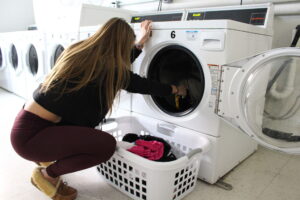
NO
by Julia McCoy ’22
Opinion Staff
For college students, finding time within our busy schedules to do laundry is hard enough. What makes it even harder is when you return to retrieve your laundry only to find it sitting on top of the machine.
Some people take it upon themselves to remove other people’s laundry from the machine. But is this the right thing to do? Do those people have a right to touch another person’s clothes?
Imagine how it would feel to walk into the laundry room and see your still-wet clothes sitting outside of the dryer. This is certainly not in line with the Friar Friendliness that was taught at orientation.
With that being said, there is a point when the wait becomes too long. If the laundry has been in there for an extensive amount of time, either overnight (if you prefer to do your laundry early in the morning) or for a period that exceeds 20 to 30 minutes, there is more reason to be agitated and consider taking the laundry out.
However, there are other factors that make touching someone else’s clothes less than favorable. For instance, you are either touching someone’s clothes or the sheets that they sleep on. Yes, they are clean, but, again, think about being on the receiving end of that—knowing that someone had touched your clothes and left them out in the open.
The laundry room is a public place. Some buildings offer protection like card access, but this still does not prevent the many inhabitants of that building from having access to your clothes. As such, if someone’s clothes were taken out of the washing machine or dryer, they are more susceptible to theft.
Most importantly, this school emphasizes respect for others through our saying “Friar Friendliness.” It certainly is not very friendly to take your peer’s laundry out of the dryer simply because you are in a rush to use the machine.
YES
by Emily Ball ’22
Opinion Staff
When it comes to doing laundry, busy college students need to make time in between classes, homework, club meetings, and the gym. Because of a college student’s busy lifestyle, it is completely justifiable to take out somebody’s laundry if it has been done in the machine for a while.
“I think that it is an unspoken agreement that we are all just busy and have to work with each other on our schedules,” Lauren Petrillo ’22.
Students oftentimes forget that their laundry is even in the machines, so it is acceptable to take out laundry that is done in a machine that has been sitting there for a while. Laundry comes second to classwork and other priorities, so people have to be quick to get this trivial task completed.
“As a biochemistry major, I am always on a strict schedule, so I have to cram in my laundry when I have free time,” Lauryn Anthony ’22 said. “I take out people’s clothes from the laundry machines when I am in a rush because I don’t have the time to wait.”
Some may argue that it is disgusting to touch other people’s clothes; however, they must keep in mind that these clothes are clean as they are in the washing machine. Also, students are very respectful when it comes to taking clothes out of the laundry. People always place the clean clothes either on top of the machine or in the laundry bin that is left near the machine.
“I always leave my basket outside the dryer I am using and every single time somebody takes my clothes out of the dryer, they put it into my basket,” said Julia Wilson ’22.
Laundry is a monotonous task that every college student has to deal with, so it must be completed in a timely manner. With the busyness of college, it is completely justifiable and makes total sense to take clean clothes out of a washer or a dryer—as long as they are done drying—if they have been sitting in there for a while.
Tangents & Tirades
by Andrea Traietti on February 13, 2020
Opinion
Dunkin’ Cam for the Mail Room
Have you ever gone to pick up a package only to see the line is out the door? In a situation like this, it makes it increasingly more difficult to fit going to the package room into our already busy days as students. Not to mention that your package will be sent back if it is not claimed within five days of arrival. One way to avoid this problem would be to add a camera, similar to the Dunkin’ cam, to the package room.
Most people pick up their packages between classes, which is the source of the problem. Everyone is in the same mindset, thinking it is most convenient to stop by after they finish class, which only causes more of a wait.
The addition of a camera outside of the package room could ease this stress, not only for those working at the time, but also for students who have limited time to pick things up. The benefits do not only include convenience, but also efficiency. If students have more free time, although it may be marginal, it can contribute to better grades and a more involved campus life in general.
The integration on the My PC app could be seamless. Programming and installation are very minimal tasks, which could result in numerous benefits, including the ones listed above. This could be an opportunity to impact the campus in a widespread way— to ease the stress on students’ busy schedules as well as the package room employees.
As a benefit to students there, it should be a student-run push for this integration. Similar to the Ray improvements, if there is enough support for this, change is attainable. Students have more power than we realize, and that should be used to our advantage, which is the reason why students should band together to get this achieved.
—Peter Mazzella ’22
Reading to the End of the Page
What attracts you to an article? The title, the content, or both? Most young adults in our current society attempt to read the news but stop after the first paragraph or glance through. They don’t read the entire article, and this can cause many problems.
It is possible that when we only glance through an article, we lose the main focus and interpret it in ways that are different from what the author meant. For example, we can look at the recent Coronavirus issue, where most of us only read the title or first paragraph of an article and not the entirety of it.
Reading the headline without getting all the information can lead to the spreading of false information, rumors, and possibly hysteria, as has been the case with the Coronavirus. We need to be careful with how we interpret and digest information that we read.
Reading the news is essential to be informed about our society today and it is a great way to be educated in modern events. But when most are just skimming or not truly reading the whole content, this can become problematic for the individual and society.
We need to push everyone to read the full article, and then discuss the facts which they are reading. This will help so many young adults be better educated on the news that they are reading daily.
—Erin Garvey ’22

Becoming a Bookworm
After a long day of classes or work, people dream of hopping back into a nicely made bed, opening up their laptop, and binge-watching Netflix shows for hours upon hours. While spending time this way is certainly desirable, reading for pleasure is a great, or even better, alternative.
With a busy lifestyle and loads of reading for homework, college students might argue that reading for pleasure cannot fit into their schedule. Why would they want to add even more reading on top of their reading for classes?
When it comes to reading for pleasure, one can choose a book that appeals to their specific taste instead of something assigned that they do not enjoy. If you like drama, try Big Little Lies by Liane Moriarty. If you enjoy coming-of-age fiction, try Where the Crawdads Sing by Delia Owens. If you like fantasy fiction, read the Harry Potter series by J.K. Rowling. If romance is more your thing, any of the Nicholas Sparks books will do. There are options for any type of interest and any type of reader.
Also, there is no time crunch when it comes to reading a book for fun. One can read for 10 minutes before bed, a few hours on the weekends, or in between classes for a little break.
If you read this and you are still convinced that you would prefer Netflix, challenge yourself to read a book and afterwards watch the movie that is based on that book. Try The Hunger Games, The Outsiders, or The Great Gatsby, and then watch the movies to see how your interpretation of the book comes alive.
Reading for pleasure challenges the mind in a way that watching television cannot. It’s a way for one to escape reality and fully transport one’s self into a whole new story.
—Emily Ball ’22
Learning to Love PC Dances: School-Sponsored Dances Offer a Break from the Routine of Weekends
by Andrea Traietti on February 6, 2020
Opinion
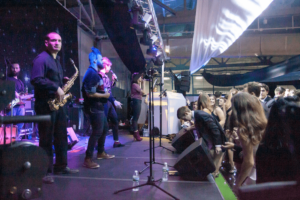
by Emily Ball ’22
Opinion Staff
In terms of a normal weekend at Providence College, one can expect a typical routine involving hanging out with friends, exploring the city, grabbing a bite to eat, and other little excursions.
Although these typical weekends are very entertaining in and of themselves, school dances and other events are perfect for mixing up the weekends with an extravagant night of dressing up and dancing with friends.
Some people argue that these dances are not worth going to because dressing up is a hassle or because they have to buy a ticket in order to attend. Yet, these dances offer a nice break from a typical weekend and are actually an inexpensive way to hang out with one’s friends in a different setting.
Although dressing up requires a little more effort than normal, it is fun to get ready with friends and come together to take pictures. Students may think that dressing up means buying new clothes, but this extra cost can be avoided by reusing old dresses and dress shirts from past events or borrowing from friends.
“I think that having school dances, at least from BOP’s perspective, is a great way to change up the redundant weekend scene. People love an excuse to dress up once in a while and take pictures. But more importantly, they create memories and the pictures people take you will have forever. So it is just a fun way for people to dress up, get together in a different setting than normal, and make memories,” Mariella Catalano ‘22, a member of Board of Programmers (BOP) said.
The reason that students must pay for a ticket in order to attend is because of the food and entertainment costs. Entrance into dances cannot be free if the school provides amenities for the students.
At PC, BOP works hard to provide delicious food and quality entertainment, including a live band at the Black & White Ball for the students to enjoy.
“For everything they provide at the dances, I think that the cost of a ticket is very much worth it,” Maddie Guth ‘22 said. “If BOP is able to get us food like pizza and decorate the Peterson Recreation Center so nicely then we should be willing to pay a small price to get in. Also, the band and the music that they have at the dances are worth the money because they bring good energy and are always playing songs that we know.”
Additionally, the tickets are inexpensive for the quality of entertainment that is provided at the dances. For instance, the Frozen Friar Ball, a dance for the class of 2022, only costs students $5, and the Black & White Ball, which offers a live band that plays popular music, only costs students $20. PC also offers food such as pizza and small handheld desserts, which also contributes to the small fee students have to pay.
“Seeing how much work we put into the dances, I wish more people would go to experience them. It is a privilege to be able to put on these dances, and they are a great way to get a break from the normal weekend routines,” Kevin Rockwal ‘22, a member of BOP said.
Not only that, but, “The dances have only gotten better each year so I think people should expect that to continue this year!” Rockwal said.
Although there is nothing better than a weekend with friends and relaxing, school dances offer a change in the typical routine. School dances are the perfect way to get members of a class or the entire school together for a night of fun and dancing.
Tangents & Tirades
by Andrea Traietti on January 30, 2020
Tangents
The Shower Charade
For nearly everyone, the shower serves as a type of modern shrine. While monks meditate in the mountains, we students seek a similar Zen state of mind in our very own showers.
This comes as no surprise, though, because the shower is one of the only places where we can stare at a wall for 45 minutes and enjoy every second of it.
It is a shame that the place we hold so dear is under attack here at Providence College. The assailant takes on a nameless, faceless, and intangible description, and only submits to the laws of fluid dynamics. It is what allows us to brush our teeth and wash our hands, only to hurt us when we least expect it. It is the water pressure.
What was once a safe refuge in the bathroom has now been turned into a dangerous place where we all stand vulnerable to extreme water temperatures at any moment. With only the flush of a toilet, or a turn of the faucet handle, our peace of mind is scorched away in an acute stream of blistering water.
The shower charade is unfortunately known by many underclassmen who live in the dorms, and is in many ways an unavoidable aspect of college life. Red skin and boiling water aside, this unusual quirk of PC is only a fraction of the college experience, and in a very real way will make this experience that much more memorable.
—Joseph Kulesza ’22
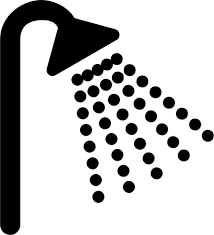
Ray Improves Everything but Hours
Raymond Dining Hall has made many changes this semester, some of which include adding a full omelet bar, more stove tops at the U-Cook station, fruit smoothies in the mornings, and many more new features.
Although the quality of the food is improving, the one thing that they did not fix and should focus on improving is the inconvenient hours.
They advertise that breakfast is served daily until 11 a.m. from Monday to Friday, yet when students get out of their 9:30 a.m. class at 10:20 a.m. and rush to Ray for breakfast, most of the breakfast foods are being put away. They are left to pick between toast, bagels, and the lunch foods that are already being put out. If breakfast is open until 11 a.m., the breakfast foods should stay out until then.
Some may argue that students should wake up earlier and get breakfast before class, but this option may not be possible for students who stay up late studying.
Another aspect of the operating hours that Ray should amend is the closing times. From Monday to Thursday Ray is open until 9 p.m., on Friday and Saturday until 7 p.m., and on Sunday until 8 p.m. The variation in these hours is confusing, as students often mix up the timing and forget which day closes at which time.
Furthermore, Ray should stay open later than 7 p.m. on weekend nights, like other schools do, in order to offer late night meals and snacks. Although the dining hall offers “late night” breakfast or snacks during finals weeks, they should work to offer this feature more often.
All of the hard work put into improving the quality of the food at Raymond Dining Hall has produced satisfactory results. The next step in this improvement process must be the hours of operation as they are both inconvenient and confusing.
—Emily Ball ’22
Being a Respectful Netflix Viewer
Hernandez, Simpson, Bundy. While some of these names previously represented famous figures turned murderers, it seems that Netflix has changed their identities yet again—documentary series stars.
Netflix now has a number of major documentary series out about murder trials, all of which are extremely popular. Some of the major ones are The People vs. O.J. Simpson, Making a Murderer, and The Ted Bundy Tapes. Within the past month, two more series were added, including The Mind of Aaron Hernandez and Don’t F**k with Cats.
What all these series have in common is the entertainment value they produce. They tend to immerse their audience in the trial and give insight into the mind of the killers to better understand their motives. At the end of the day, these are series based off of someone else’s murder and should be treated as such.
While the intrigue inside the murderers’ minds can be all-consuming, it is important to remember what these shows are about, and that there is a respectful way to watch them and talk about them.
When you overhear people talking about the new binge-worthy series on Netflix, do not forget the show is about someone’s death, and respect should be paid to the victim. Rather than talking about these series as fictional shows, remember the victims and their families. For the families, these Netflix series serve as constant reminders of their loss, and we should all remember to be as respectful as possible when discussing these series.
—Katie Belbusti ’22

Tangents & Tirades
by Andrea Traietti on January 16, 2020
Opinion
The TikTok Takeover
Today’s generation seeks entertainment from social media apps such as Instagram and Snapchat, especially the memes that these types of apps have to offer. With the growing influence social media has on society, new apps such as TikTok are created to provide this source of entertainment.
Many consider the app to be the new version of Vine. TikTok merged with the app Musical.ly to provide entertainment through funny videos and dances to popular songs that people can learn with their friends.
The most amusing part of TikTok is the trending dances. Creators on TikTok come up with easy-to-learn dances with popular dance moves to the beat of popular songs. The duet function on the app also allows users to create a side-by-side TikTok with their friends doing these dances together.
TikTok is different from Vine and other social media apps like Instagram because it offers two main feeds: one with trending videos on the For You page, and one with videos from TikTokers you follow.
The For You Page is the homepage of the app. This feed is where trending videos appear as well as TikToks from popular creators. One of the greatest aspects of TikTok is that the For You page customizes the videos based on your interests and the TikToks you have liked. For example, I have a habit of liking dog videos.
TikTok truly embodies its name, as the time tick tocks away when you get deep into the For You Page filled with hundreds of thousands of funny videos.
—Emily Ball ’22

Is There Anything to do in Winter?
Is Christmas the only fun part of winter? It certainly can seem that way sometimes. Yet there are plenty of ways to make the first few weeks of spring semester lively while embracing the chill in the air.
Hockey games always remind students of winter, and Providence College’s team is definitely entertaining to watch! With tickets starting at four dollars, these games are a great way to take a break from homework and hang out with your friends.
Additionally, PC usually offers a few open skate nights for all students. Serving cookies and hot chocolate, these skate nights allow you to hang out on the rink in Schneider Arena.
If you are not a great skater, or are looking for something less active to do, downtown Providence has some wonderful opportunities. Thayer Street boasts some great restaurants that are just a quick drive away.
And, in the winter, what do students love more than a good hot coffee, tea, or hot chocolate? Blue State Coffee on Thayer Street is a great place to have any of these and more! Just a short drive from campus, a coffee shop is a change of scenery that can be much needed once we reenter the stress of schoolwork.
Although the cold certainly limits our opportunities to get outside, winter in Providence is not to be overlooked. Embrace the snow while it’s here, because it won’t last much longer!
—Julia McCoy ’22

New Year, New Healthy Habits
As always, in the first weeks of the new year, “New Year’s Resolutions” are a common topic of conversation. The most classic and common resolutions, especially among college students, relate to body image and physical appearance. As we enter a new decade, it is important to focus more on the betterment of one’s whole self rather than just physical appearance.
The obsession with having an attractive physical appearance takes away from the more important resolutions that college students can make. While a lot of people aspire to lose 15 pounds, get toned, finally achieve that six pack, etc., other things such as aspiring to make more people smile, be more thankful, start a new hobby, volunteer locally, and other resolutions should take priority over the physical appearance.
While it is important to maintain a healthy lifestyle by eating healthy and exercising, these practices should not dictate your happiness and focus going into 2020. A lot of these resolutions can lead to an unhealthy obsession and relationship with body image that can impede upon other factors in one’s life.
So as this new year and new decade commences, remind yourself that a resolution can be more than just a number on the scale or how snug your jeans fit. The betterment of oneself is more than just physical and it is important that happiness, curiosity, knowledge, and more are not forgotten in the process of self-improvement in 2020.
—Marie Sweeney ’20

Banning “the B-Word” is a Limit on Free Speech: Attempt in Mass. to Ban the Word “B***h” Sparks Debate
by The Cowl Editor on November 21, 2019
Opinion
by Emily Ball ’22
Opinion Staff
When I say “the b-word,” I am sure hundreds of words come to your head. Beautiful, bird, baking, basket — of the thousands and thousands of words that begin with the letter “B,” Massachusetts is taking ridiculous steps in attempting to ban one of them.
Boston Democratic Representative Daniel Hunt sponsored a bill that would ban the word “b***h” in the state of Massachusetts, making it illegal to speak that word. This bill, which reflects the sensitive nature of society today, would take away basic rights from Massachusetts’ citizens.
“According to the bill, penalties would be similar to those outlined in the other subsections of the state law, which, depending on the subsection, provide for a fine of not more than either $150 or $200, or jail time of up to six months,” Christopher Gavin from Boston.com said.
Hunt sponsored this bill because of a request by a Massachusetts constituent. After receiving backlash from the Republican party, Hunt posted on his Twitter account clarifying why he sponsored such a bill.
“One of the responsibilities of all Representatives is to serve as a conduit for direct petitions from our constituents. It’s a long-held tradition that gives every Massachusetts resident a voice inside the halls of the State House and a chance to raise their personal interests before the legislature. While this specific instance may amuse some and alarm others, it remains an important process for self-representation,” Hunt said.
While the government is responsible for taking the constituents’ opinions into account, they should not be taking away basic rights from their constituents in doing so. This ban, if enacted, would violate the First Amendment, which allows American citizens the right to freedom of speech. “Banning these words creates a culture of censorship,” Leo Hainline ‘22 said. “Freedom of speech is something that we should value and preserve, and banning words, even if some find them offensive, is detrimental to the fundamental values we hold as a country.”
Some people may argue that the government has the responsibility to violate the First Amendment if the word is hateful or derogatory; however, this argument is invalid because the word “b***h” is not only used in a hateful manner, but often in a joking manner among friends.
Although it is technically a curse word, the word “b***h” is a word that does not reflect any hateful intentions. The use of this word is mostly in a joking manner among friends, not in a manner of bullying or demeaning others. The fact that someone could receive jail time for saying the word “b***h,” especially if it is in a casual manner among friends, is evidence that people are becoming too sensitive in current society.
“It’s not like ‘b***h’ is hate speech or anything close to that,” Leo Hainline ‘22 explained. “And I think it is a reflection of how soft and sensitive people are getting these days.”
Further, banning the word “b***h” indirectly affects various industries such as the music industry, the talk-show industry, and the social media industry in Boston where people would then need to act with extra precautions when speaking at their job.
Although there are plenty of derogatory words that do aim at demeaning others, “b***h” is not one of them. Banning this word in the state of Massachusetts does not improve the well-being of the citizens, it just infringes on their basic rights and encourages the sensitivity present in society today, and you can legally call me a “b***h” for saying that.

